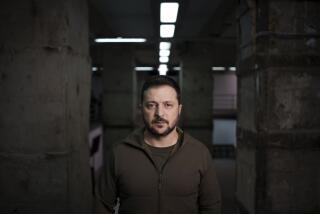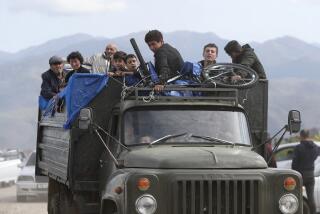Kazakhstan Leader Tightens Grip on Reins of Power : Central Asia: In referendum, president of oil-rich nation is asking voters to extend term until year 2000.
- Share via
ALMATY, Kazakhstan — President Nursultan A. Nazarbayev is in the midst of a coup to take unfettered control of this enormous, oil-rich country in Central Asia--a region of five nations that broke free of the Soviet Union only to grow increasingly dictatorial themselves.
Since becoming president in 1991, Nazarbayev has been the driving force behind capitalist economic reforms. His Kazakhstan--a country of Siberian steppes and Asian mountains wedged between China and Russia--boasts a free press and billions of dollars in foreign investment.
The oil, along with Nazarbayev’s willingness to scrap Soviet nuclear weapons that were left behind, has earned Kazakhstan the respect and attention of Western governments. But in recent weeks, Nazarbayev has looked less like a democrat and more like the sort of dictator that has flourished in post-Soviet Central Asia.
Kazakhstan’s more harshly ruled neighbors include Turkmenistan, where President Sarparmurad A. Niyazov has put his own face on the country’s new currency, and Uzbekistan, where President Islam A. Karimov has dissidents beaten and just won a referendum to stay in power through the year 2000.
But Kazakhstan--which is larger and has earned more foreign investment than all other Central Asian nations combined--is the key to this region. If Nazarbayev’s play for power succeeds, a territory five times the size of France will fall under his personal rule.
Nazarbayev’s coup began last month, when the Supreme Court, citing irregularities in last year’s elections, ruled the new Parliament illegitimate. Nazarbayev first protested the ruling, but then enforced it by decree March 25, dismissing a Parliament that had opposed his economic reforms.
Russian and Western observers nodded approval. They, too, had criticized the elections as corrupt and sloppy--as are most elections in Central Asia.
Two television news shows were mysteriously unplugged for the evening, machine-gun toting Interior Ministry patrols quietly took to the streets of Almaty, the capital, and the parliamentary newspaper, Soviety Kazakhstan, was abruptly shut down--officially over debts to government-owned printing presses.
But Nazarbayev promised new parliamentary elections within three months, prompting U.S. Ambassador William Courtney to say that the crisis proved democracy was taking root in Central Asia.
Not so. Nazarbayev indefinitely postponed new elections, and government newspapers suddenly began praising the virtues of “enlightened despotism.”
Next, an obscure advisory body--the Assembly of the Peoples of Kazakhstan, which Nazarbayev created in January--met with great fanfare in the Parliament building and begged Nazarbayev to cancel the 1996 presidential elections.
The assembly suggested that he extend his presidential term through Dec. 1, 2000. Nazarbayev demurred, but then agreed to put the question to his country’s 17 million people on Saturday, in an Uzbekistan-style referendum. Even as that announcement was being made, 99.6% of Uzbekistan’s voters were extending their ruler’s term.
Such referendums are becoming the fashion in Central Asia. Last year, Turkmenistan’s Niyazov won 99.99% of his people’s votes to extend his one-man rule until 2002. After Karimov’s victory and Nazarbayev’s announcement, President Askar A. Akayev of Kyrgyzstan announced that he may follow suit.
Nazarbayev seems likely to win. He is popular, and most Kazakhs openly hanker for stronger leadership. He has also handpicked a new Electoral Commission to count the votes.
Doulat O. Kuanyshev, the president’s press secretary, said the referendum will also empower Nazarbayev to rewrite the constitution to give himself even more power.
With Parliament sidelined, Nazarbayev has busily issued more than two dozen presidential decrees. He has adopted a national budget, shaken up his Parliament-approved Cabinet and launched a voter-pleasing crackdown on crime.
Police now can use deadly force whenever they feel threatened and jail people for up to 30 days without explanation. To get alcoholics off the streets, Nazarbayev has promised to strengthen the Soviet-era system of drunk tanks.
“We know that these are stern measures,” Nazarbayev told more than 400 law enforcement officials gathered for a televised hearing three weeks ago on organized crime. “But the people will support them.”
Not all of them do. Parliamentary deputies are furious--many at shabby treatment they personally received, a few at the damage done to democracy.
Last month, more than 70 deputies, led by Vladimir V. Chernyshev, began a hunger strike. Chernyshev, 57, also threatened to set himself on fire on the U.S. Embassy grounds in response to Courtney’s early, positive assessment of Parliament’s disintegration.
Courtney has since rescinded the comments. The new American position, stated by Defense Secretary William J. Perry in a visit here earlier this month is that Nazarbayev has taken a step backward from democracy.
Seven days into his hunger strike--and one hour before Nazarbayev opened his organized crime hearings--Chernyshev was attacked on the staircase of his apartment building. Doctors said a severe beating left him with a concussion, a broken nose, a broken rib and kidney damage.
Deputies quickly called off their strike; Chernyshev is recuperating at home. And though he doesn’t particularly care for America, he has requested U.S. political asylum.
More to Read
Sign up for Essential California
The most important California stories and recommendations in your inbox every morning.
You may occasionally receive promotional content from the Los Angeles Times.













